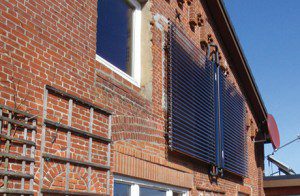By Stephanie Clark, Policy Manager, Onshore Renewables at Scottish Renewables
IT’S all too easy to scoff at solar power in Scotland, but falling hardware prices and more enlightened attitudes mean the technology can now play a huge helping hand on our journey to a greener future.
Solar PV panels which generate electricity are now commonplace on buildings, but there is another solar system whose potential has hardly been tapped north of the border.
Solar thermal panels use even tiny amounts of sunlight to generate heat which can be used to slash fossil fuel bills in homes, offices and public buildings. But while those installing renewable heat technologies like heat pumps or biomass boilers benefit from payments through the Renewable Heat Incentive, solar thermal suffers from an anomaly.
While payments are made when the technology is used to heat hot water, homes miss out if they’re using solar thermal panels for space heating – a potentially lucrative gap in a cold climate like Scotland’s.
Changes to the RHI scheme are clearly needed to allow us to fully realise the potential of solar thermal.
Research carried out for solar thermal installer Begetube, based in Inverness, found that solar thermal systems in the UK are being under-used compared to those in Europe, with the focus in the UK solely on water heating, rather than on a holistic approach to whole-building warmth.
The research, carried out by Heriot-Watt University’s School of the Built Environment, found that solar thermal systems in Scotland fared just as well as those in southern England, and that two actions – increasing the size of the heat store (essentially a large water tank) and using solar thermal for space heating as well as hot water – provided huge efficiency gains.
Dr Fan Wang, who carried out the research in October last year, notes in his conclusion: “The higher the solar irradiation, the higher the energy savings are. But the effect of the location is really not that significant. The savings are made by first providing both domestic hot water supply and space heating provision. Secondly and more importantly, they are achieved by the extra heat storage.”
Heat plays a vital role in our lives, whether at home, at work, or in the industrial processes which drive our economy. In fact, more than half of the energy consumed in Scotland is in the form of heat, with the majority of homes, businesses and public buildings using conventional gas boilers.
This dependence on fossil fuels, coupled with poorly-insulated housing stock, means that heating also accounts for 50% of Scotland’s total CO2 emissions.

While Scotland has made great progress in the development of renewable electricity, the heat sector continues to lag behind.
As of 2012 – the most recent year for which figures are available – we had achieved just 3% of our 2020 target to deliver 11% of Scotland’s heat demand from renewable sources, leaving us well below the European average.
Renewable heat sources offer affordable warmth at predictable prices – vital when the 900,000 Scottish households in fuel poverty are spending more than 10% of their income on energy.
For example, Lister Housing Association installed solar thermal panels for 49 flats in B-listed Georgian tenements in Edinburgh’s Old Town – the first time solar thermal panels have been installed in a UNESCO World Heritage Site.
The scheme provided solar water heating not only to top floor households, but also to those on the lower and basement levels, reducing fuel bills for tenants and cutting carbon emissions in a densely-populated area.
Figures from Which? show householders in an average two-bedroom semi-detached home could save £266 a year by installing solar thermal panels.
More must be done to raise awareness of the benefits of renewable and low carbon heat, and to ensure the sector receives the political attention it deserves, if we are to succeed in hitting our targets.
Scottish Renewables’ Heat network will bring together those involved in the heat sector for discussions which could shape Holyrood and Westminster policy, and with growing enthusiasm for the role of technology like solar thermal, interest is expected to be high.









